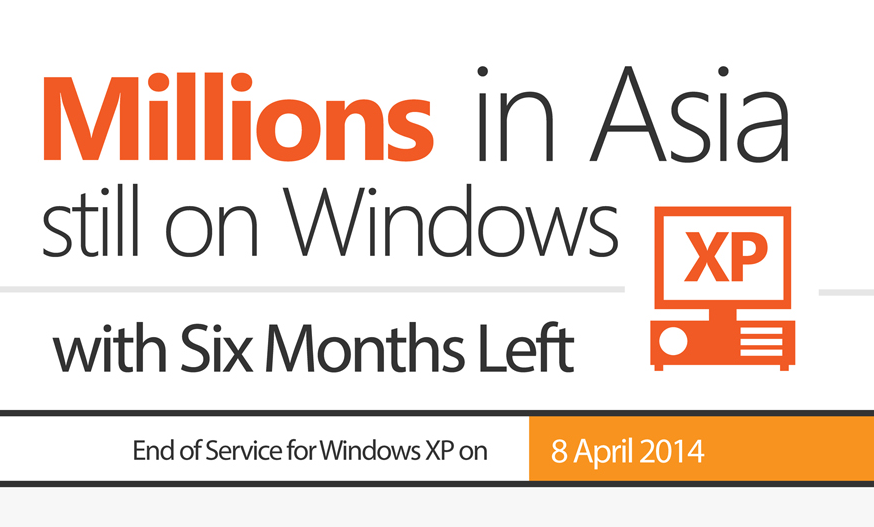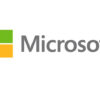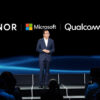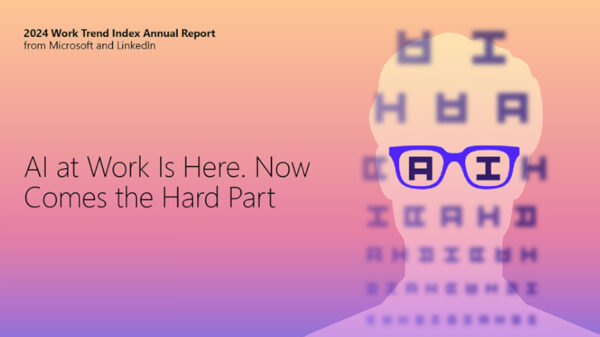After 8 April 2014, Microsoft will no longer provide security updates, non-security related fixes, there won’t be a number to call for technical assistance, or online technical content updates for Windows XP.
With half a year left, there are millions of PCs in Asia Pacific still running on Windows XP, an 11-year-old operating system which is no longer capable of handling sophisticated cyber-attacks, and current demands for data privacy and productivity.
Microsoft sent out a reminder Tuesday urging all businesses and consumers still using PCs running on Windows XP to upgrade to newer versions of Windows. According to the findings of Microsoft’s Security Intelligence Report, Volume 14, released in April 2013, Windows XP with SP3 is up to 56.5 times more vulnerable than Windows 8 RTM.
Over the last six months, StatCounter figures for September 2013 show that the installed base for Windows XP in the Asia Pacific region as a whole declined from 34% to 28%. StatCounter has also seen 1% to 4% declines in markets like Malaysia, New Zealand, Singapore and Vietnam while in markets like China, India, Indonesia, Korea, and Taiwan, the XP installed base decline was a little faster, between 5% and 10%. In the same period, 61.7% of devices are now on Windows 7 and 8, which is an increase of more than 5% for the region.
In the Philippines, 25.66% of PCs still run Windows XP, while 61% of devices run either on Windows 7 or 8.
“Clearly, there’s still a lack of urgency in organizations in Asia Pacific to make migration a priority,” says Jason Lim, General Manager of Windows Business Group, Microsoft Asia Pacific. “While no one likes change, businesses and consumers need to upgrade to newer operating systems like Windows 7 or 8 in order to modernize their computing devices and to address sophisticated threats which can compromise the safety of their personal information. This could result in additional costs associated with support and business continuity. With the typical deployment times for upgrades spanning from three to six months for small businesses, and more than six months for mid-sized businesses, we are really worried that companies are cutting it too close to the end of service date.”
Industry analysts have been advising businesses to move away from Windows XP over the past years. With six months to go before the end of support for Windows XP, analysts are stepping up their education efforts to drive a greater sense of urgency.
“Time is running out,” says Handoko Andi, Manager of Client Devices Research at IDC Asia/Pacific. “In order to make sure that PCs continue to be securely supported and operational, both consumers and businesses alike should be migrating to newer versions of the operating system now, given the termination of extended support for Windows XP in just six months’ time.”
Charlie Dai, Principal Consulting Analyst, Enterprise Architecture, Forrester Research, made the following comments in his blog post, “Take a forward thinking, while pragmatic approach to Windows Migration”, on 17th September 2013: “Windows XP and Windows Server 2003 have been widely used on the client side and server side. Very few companies have put Windows migration on its IT evolution roadmap. However, I believe the time is now for IT professionals to seriously consider putting Windows upgrade into the IT road map for the next 6 months as Windows XP and the pirated OS won’t be viable much longer to support your business.”













































































































